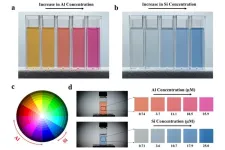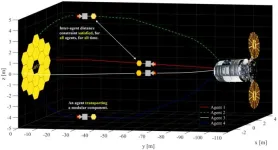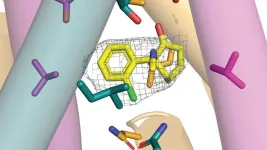(Press-News.org) University of Leeds news
Embargoed until 14 February 2025 (19:00 GMT)
---
The cool conditions which have allowed ice caps to form on Earth are rare events in the planet’s history and require many complex processes working at once, according to new research.
A team of scientists led by the University of Leeds investigated why Earth has existed in what is known as a 'greenhouse' state without ice caps for much of its history, and why the conditions we are living in now are so rare.
They found that Earth’s current ice-covered state is not typical for the planet’s history and was only achieved through a lucky coincidence.
Many ideas have previously been proposed to explain the known cold intervals in Earth’s history. These include decreased CO2 emissions from volcanoes, or increased carbon storage by forests, or the reaction of CO2 with certain types of rocks.
The researchers undertook the first ever combined test of all of these cooling processes in a new type of long-term 3D model of the Earth which was first developed at the University of Leeds. This type of ‘Earth Evolution Model’ has only recently been made possible through advances in computing.
They concluded that no single process could drive these cold climates, and that the cooling in fact required the combined effects of several processes at once. The results of their study are published today (14 February 2025) in the Journal Science Advances.
The findings will help to reconcile a debate in the Earth Science community about which processes were responsible for driving these cold periods.
Lead author, Dr Andrew Meredith, who carried out the research while working in the School of Earth and Environment at the University of Leeds, said the study helped to explain why icehouse states are so rare.
“We now know that the reason we live on an Earth with ice caps – rather than an ice-free planet – is due to a coincidental combination of very low rates of global volcanism, and highly dispersed continents with big mountains, which allow for lots of global rainfall and therefore amplify reactions that remove carbon from the atmosphere,” he explained.
“The important implication here is that the Earth’s natural climate regulation mechanism appears to favour a warm and high-CO2 world with no ice caps, not the partially glaciated and low-CO2 world we have today.
“We think this general tendency towards a warm climate has helped prevent devastating 'snowball Earth' global glaciations, which have only occurred very rarely and have therefore helped life to continue to prosper.”
Benjamin Mills, Professor of Earth System Evolution in Leeds’ School of Earth and Environment, supervised the project. He added that the results of the research had important implications for global warming and the immediate future.
“There is an important message, which is that we should not expect the Earth to always return to a cold state as it was in the pre-industrial age,” he said.
“Earth’s current ice-covered state is not typical for the planet’s history, but our current global society relies on it.
“We should do everything we can to preserve it, and we should be careful with assumptions that cold climates will return if we drive excessive warming before stopping emissions. Over its long history, the Earth likes it hot, but our human society does not.”
Ends
Further information
For media enquiries, please contact Kersti Mitchell in the University of Leeds press office via k.mitchell@leeds.co.uk
University of Leeds
The University of Leeds is one of the largest higher education institutions in the UK, with more than 40,000 students from about 140 different countries. We are renowned globally for the quality of our teaching and research.
We are a values-driven university, and we harness our expertise in research and education to help shape a better future for humanity, working through collaboration to tackle inequalities, achieve societal impact and drive change.
The University is a member of the Russell Group of research-intensive universities, and is a major partner in the Alan Turing, Rosalind Franklin and Royce Institutes www.leeds.ac.uk
Follow University of Leeds or tag us in to coverage: Bluesky | Facebook | LinkedIn | Instagram
END
Research reveals how Earth got its ice caps
2025-02-14
ELSE PRESS RELEASES FROM THIS DATE:
Does planetary evolution favor human-like life? Study ups odds we’re not alone
2025-02-14
UNIVERSITY PARK, Pa. — Humanity may not be extraordinary but rather the natural evolutionary outcome for our planet and likely others, according to a new model for how intelligent life developed on Earth.
The model, which upends the decades-old “hard steps” theory that intelligent life was an incredibly improbable event, suggests that maybe it wasn't all that hard or improbable. A team of researchers at Penn State, who led the work, said the new interpretation of humanity’s origin increases the probability ...
Clearing the way for faster and more cost-effective separations
2025-02-14
CLEVELAND—The process of separating useful molecules from mixtures of other substances accounts for 15% of the nation’s energy, emits 100 million tons of carbon dioxide and costs $4 billion annually.
Commercial manufacturers produce columns of porous materials to separate potential new drugs developed by the pharmaceutical industry, for example, and also for energy and chemical production, environmental science and making foods and beverages.
But in a new study, researchers at Case Western Reserve University have found these ...
Researchers develop a five-minute quality test for sustainable cement industry materials
2025-02-14
CHAMPAIGN, Ill. — A new test developed at the University of Illinois Urbana-Champaign can predict the performance of a new type of cementitious construction material in five minutes — a significant improvement over the current industry standard method, which takes seven or more days to complete. This development is poised to advance the use of next-generation resources called supplementary cementitious materials — or SCMs — by speeding up the quality-check process before leaving the production floor.
Due ...
Three Texas A&M professors elected to National Academy Of Engineering
2025-02-14
Drs. Vanderlei Bagnato, Rodney Bowersox and Don Lipkin from Texas A&M University’s College of Engineering have been elected to the National Academy of Engineering (NAE) Class of 2025, joining 128 new members and 22 international members. This is one of the highest professional honors for engineers.
“Congratulations to Drs. Bagnato, Bowersox and Lipkin for achieving this recognition. This prestigious honor reflects their groundbreaking contributions to engineering and underscores the exceptional talent within our faculty,” said Dr. Robert H. Bishop, vice chancellor and dean of Texas A&M ...
New research sheds light on using multiple CubeSats for in-space servicing and repair missions
2025-02-14
As more satellites, telescopes, and other spacecraft are built to be repairable, it will take reliable trajectories for service spacecraft to reach them safely. Researchers in the Department of Aerospace Engineering in The Grainger College of Engineering, University of Illinois Urbana-Champaign are developing a methodology that will allow multiple CubeSats to act as servicing agents to assemble or repair a space telescope. Their method minimizes fuel consumption, guarantees that servicing agents never come closer to each other ...
Research suggests comprehensive CT scans may help identify atherosclerosis among lung cancer patients
2025-02-14
Several cardiovascular risk factors, such as advanced age and smoking history, are prevalent among lung cancer patients at the time of the diagnosis and increase their risk of future heart disease, according to a new study being presented at ACC’s Advancing the Cardiovascular Care of the Oncology Patient course. Comprehensive assessments are needed in this vulnerable group to improve survival outcomes and quality of care for cancer patients.
Heart disease and cancer are the leading causes of death in the United States. Smoking is a shared risk factor for lung cancer and cardiovascular disease, and lung cancer patients have an amplified mortality rate with the presence of ...
Adults don’t trust health care to use AI responsibly and without harm
2025-02-14
A study finds that 65.8% of adults surveyed had low trust in their health care system to use artificial intelligence responsibly and 57.7% had low trust in their health care systems to make sure an AI tool would not harm them.
The research letter was published in JAMA Network Open.
Adults who had higher levels of overall trust in their health care systems were more likely to believe their providers would protect them from AI-related harm.
The letter, authored by Jodyn Platt, Ph.D., of the Department of Learning Health Sciences at University of Michigan Medical School and Paige Nong, Ph.D., of the University of Minnesota School of Public Health comes from survey of a nationally ...
INSEAD webinar on the dual race to AI & global leadership
2025-02-14
Digital@INSEAD is hosting a free TECH TALK X webinar “The Dual Race to AI & Global Leadership” on Wednesday, 19 February 2025 7.00 am ET / 1.00 pm CET (Duration: 60 min).
The TECH TALK will be featuring a discussion between Tim Gordon (MBA’00D), Partner, Best Practice AI and Theos Evgeniou, INSEAD Professor of Technology & Business and Director of Executive Programs in AI.
Tim, an INSEAD alumnus with over 20 years of international experience in digital transformation, global strategy and innovation, will join Theos to explore the two critical AI races reshaping our world: ...
Ketamine: From club drug to antidepressant?
2025-02-14
Ketamine has received a Hollywood makeover. It used to be known as a rave drug (street name special K) and cat anesthetic. However, in recent years, some doctors have prescribed ketamine to treat conditions from post-traumatic stress disorder to depression. “The practice is not without controversy,” notes Cold Spring Harbor Laboratory (CSHL) Professor Hiro Furukawa.
‘Should we give a hallucinogen to patients in compromised mental states?’ wonder ketamine’s skeptics. The controversy came to ...
Multilevel stressors and systemic and tumor immunity in Black and White women with breast cancer
2025-02-14
About The Study: The findings of this cross-sectional study of Black and white women with breast cancer suggest that perceived stress, perceived inadequate social support, perceived racial and ethnic discrimination, and neighborhood deprivation were associated with deleterious alterations to the systemic and tumor immune environment, particularly for Black women. Understanding biology as a possible mediator of cancer health disparities may inform prevention and public health interventions.
Corresponding Author: To contact ...





